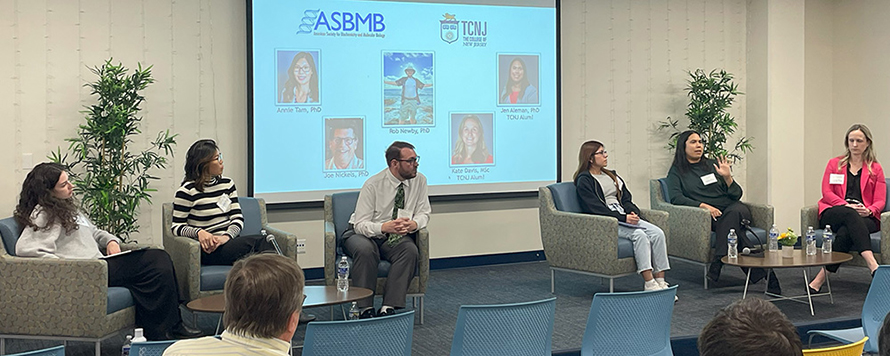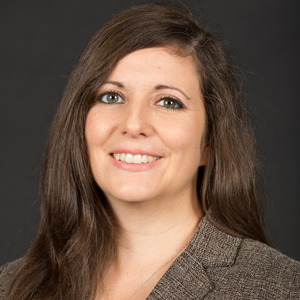How do you help a biochemist find a career path?
When I was an undergraduate majoring in biochemistry, I felt both the excitement and the terror that come with being interdisciplinary. Bringing biology and chemistry together appealed to me, and I loved the crossovers: learning the organic chemistry mechanisms that went on in enzyme active sites, finding out what made green fluorescent protein green. But when it came to figuring out what to do with an interdisciplinary degree, I was scared and confused. What was I going to do with a degree in biochemistry?
Earlier this year, I helped Tracy Kress, a professor at The College of New Jersey, or TCNJ, and Mark Witmer of Bristol-Myers Squibb host a networking event held at TCNJ. Funded by the American Society for Biochemistry and Molecular Biology Membership Committee and the TCNJ School of Science, “What Can I Do with My Chemistry/Biology Degree? An ASBMB Career Panel and Networking Event” was intended to introduce undergrad and grad students at TCNJ and other local institutions to professionals in a variety of careers.
The panel included Jennifer Aleman, a science grant writer at TCNJ; Kate Davis, a field marketing manager at Dow Chemical; Robert Newby from the New Jersey Department of Environmental Protection Division of Science and Research; and Annie Tam, from regulatory affairs at Bristol-Myers Squibb.
Each panelist provided insight into their unique career path, including how they manage challenges and advice for students. The session then opened to general networking at tables hosted by professionals in academia, in pharmaceutical industry and in government and policy.
As the cheese platter emptied and conversations ran deep, students and the 14 professionals present shared information and connections, insight and personal perspective.

Benefits
Events like this benefit everyone involved.
- Students are exposed to novel career paths, including some they may never have heard of. Diverse participants can talk about taking nontraditional jobs, switching careers or reaching their position in a nonlinear way. Students may not see themselves in positions they know through their academic institution but worry that their options are limited.
“Career paths change in very unexpected ways, and everything happens for a reason,” biology major Jacqueline Kestenbaum said. “That gave me reassurance.” - Students can ask questions and learn about diverse professions in a low-stakes environment. Many students don’t interact with professionals outside of job fairs, where they’re trying to make a good impression and distribute their resume, or even at an interview. An event like this provides a casual and comfortable place to speak one-on-one with professionals without worry, a place where students can gather knowledge, opinions and advice.
- Panelists from varied backgrounds, pathways and professions can connect. All the panelists attended with a common purpose, to share their experiences and influence the next generation. Such like-minded individuals across careers rarely find themselves in the same space. An event like this can provide a springboard for collaboration and spark new ideas.
- Students learn about the activities of ASBMB, both the national society and local student chapters. An event like this opens to doors to other experiences with ASBMB, whether it is traveling to a national meeting or participating in other local or regional events. Increased participation and membership will increase the influence and reach of ASBMB as a professional organization.
Planning
Are you interested in organizing an event like this at your institution? Here are a few planning tips to keep in mind.
- Get the date right. As with any campus event with moving parts, finding the proper date can be a challenge. At certain times of year, students’ stress levels and focus may preclude participation in such events. Balancing campus scheduling with event scheduling is key.
- Keep diversity in mind. Cast a wide net to find a diverse array of speakers from an engaging variety of biology- and chemistry-oriented careers to be part of both panel and networking sessions. Bear in mind that students want to see a version of themselves and that representation matters on all accounts. Ensure that students can to speak to people who come from similar life experiences or who have faced familiar challenges.
- Find an inviting venue. Our panelists were on a slightly raised platform with two student moderators sitting among them. With low tables and comfortable chairs, it resembled a talk show more than a scientific forum, which made the students more comfortable asking questions. For the networking portion, tables were set up around the periphery, with plenty of refreshments. Students and professionals mingled and mixed.
- Have fun with it. From selecting the food to designing the questions, when you plan such an event keep in mind that sharing a snack and a laugh can sometimes be more memorable than the sagest advice.
Satisfied participants
More than 50 students attended the event, most of them undergraduates. According to an anonymous survey, 70% of respondents said the event definitely helped them learn about careers in science they were previously unaware of, increased their knowledge of different trajectories that can lead to careers in science, and provided a better understanding of what it means to pursue a successful path to a science career. And 90% of respondents stated they would attend events like this in the future.
Anonymous student comments described the benefits of the event: They no longer think medical school is the only avenue they can pursue, they are considering a career in government agencies now, and ultimately, the event made them feel more confident about their course of study.
Biology major Kestenbaum said the event made her more interested in pursuing research positions and that having the first half of the event on panel discussions but the second half “conversational” where she could “choose who to talk to” made the entire experience very favorable.
If we host similar events again, we’d keep the footprint the same and seek to increase the careers represented. Professionals who were part of the networking portion said they’d be interested in becoming panelists in the future.
At least one student participant stated that the “food part was really good.”
Thinking back to when I was an undergraduate, would I have attended such an event? Most assuredly yes. I recall wondering what my next move would be after I continued to graduate school. Such an event can be groundbreaking for students like me — passionate about our studies but unsure of our plans.
While I’m satisfied with my path, I know that careers are not one size fits all and pathways to the future can take many directions. The best we can offer the next generations is the diversity of choice and the space to find the best route to their own success.
It also never hurts to have an array of delicious and rare cheeses. Come for the refreshments; stay for the eye-opening conversations and networks forged.
Enjoy reading ASBMB Today?
Become a member to receive the print edition four times a year and the digital edition monthly.
Learn moreFeatured jobs
from the ASBMB career center
Get the latest from ASBMB Today
Enter your email address, and we’ll send you a weekly email with recent articles, interviews and more.
Latest in Careers
Careers highlights or most popular articles

Sketching, scribbling and scicomm
Graduate student Ari Paiz describes how her love of science and art blend to make her an effective science communicator.

Embrace your neurodivergence and flourish in college
This guide offers practical advice on setting yourself up for success — learn how to leverage campus resources, work with professors and embrace your strengths.

Upcoming opportunities
Apply for the ASBMB Interactive Mentoring Activities for Grantsmanship Enhancement grant writing workshop by April 15.

Quieting the static: Building inclusive STEM classrooms
Christin Monroe, an assistant professor of chemistry at Landmark College, offers practical tips to help educators make their classrooms more accessible to neurodivergent scientists.

Unraveling oncogenesis: What makes cancer tick?
Learn about the ASBMB 2025 symposium on oncogenic hubs: chromatin regulatory and transcriptional complexes in cancer.

Exploring lipid metabolism: A journey through time and innovation
Recent lipid metabolism research has unveiled critical insights into lipid–protein interactions, offering potential therapeutic targets for metabolic and neurodegenerative diseases. Check out the latest in lipid science at the ASBMB annual meeting.

